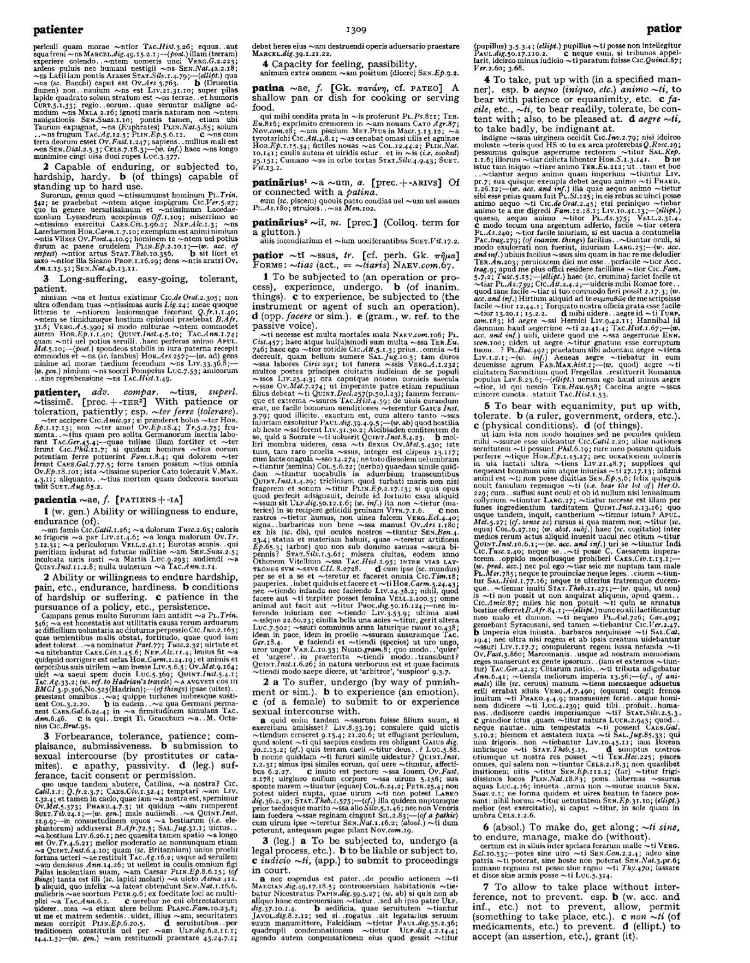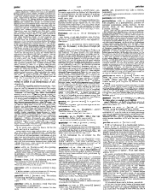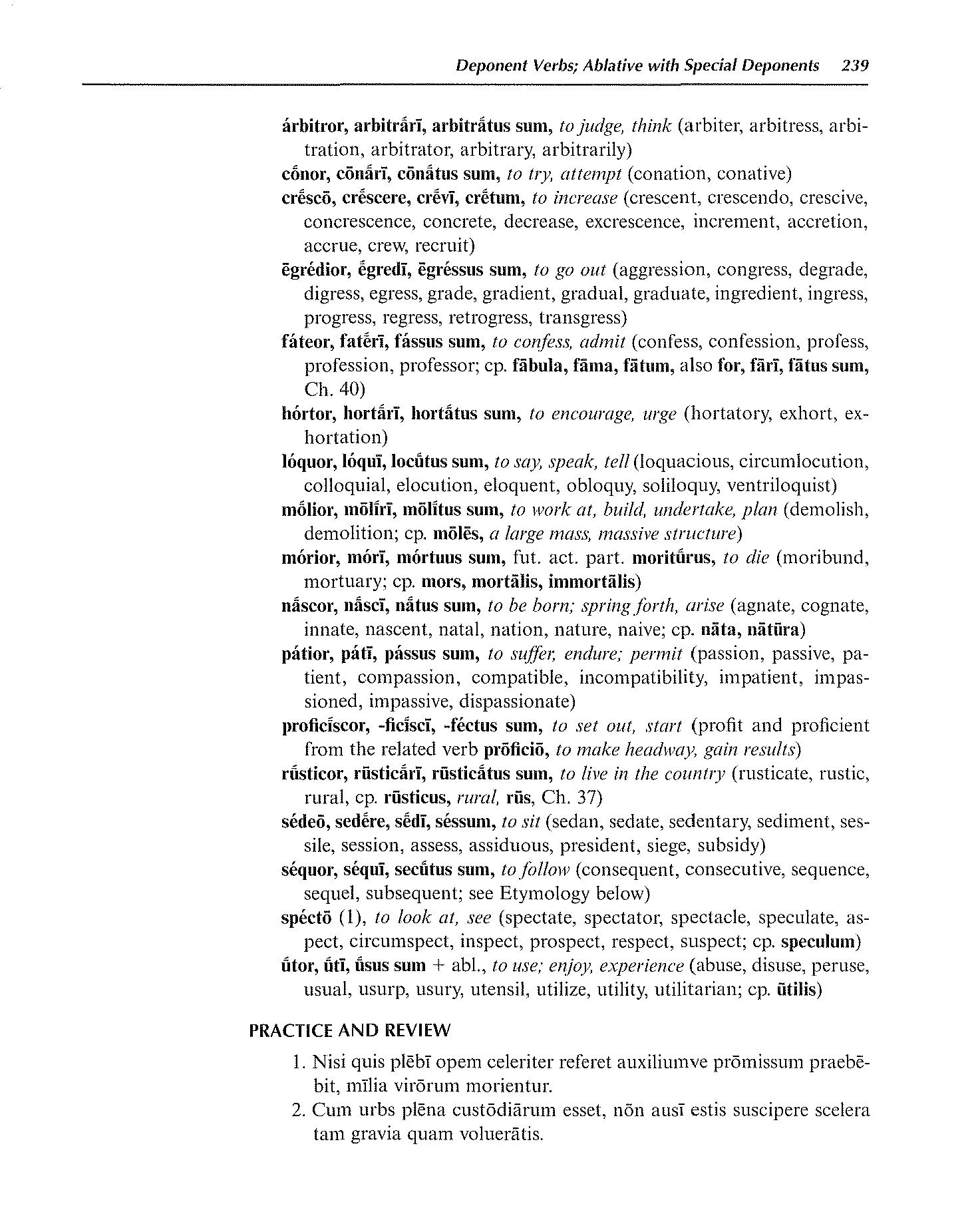
page_listing.tpl
page_subListingDetails.tpl
sub_listingDetails_style1.tpl
sub_listingDetails.title.tpl
patī to suffer
patī is a Latin Verb that primarily means to suffer.
Definitions for patī
Wheelock's Latin
Verb
- 1
to suffer, endure, permit
English derivatives:
passion passive patient compassion compatible incompatibility impatient impassioned impassive dispassionate
Oxford Latin Dictionary
Verb
- 1
To be subjected to (an operation or process), experience, undergo. (b) (of inanim. things). (C) to experience, be subjected to (the instrument or agent of such an operation). (d) (opp. facere or sim.). (e) (gram., w. ref. to the passive voice).
- 2
(a) To suffer, undergo (by way of punishment or sim.). (b) to experience (an emotion). (c) (of a female) to submit to or experience sexual intercourse with.
- 3
(leg.) (a) To be subjected to, undergo (a legal process, etc.). (b) to be liable or subject to. (c) iudicio ~ti, (app.) to submit to proceedings in court.
- 4
To take, put up with (in a specified manner). esp. (b) aequo (iniquo, etc.) animo ~ti, to bear with patience or equanimity, etc. (c) facile, etc., ~ti, to bear readily, tolerate, be content with; also to be pleased at. (d) aegre ~ti, to take badly, be indignant at.
- 5
To bear with equanimity, put up with, tolerate. (b) (a ruler, government, orders, etc.). (c) (physical conditions). (d) (of things).
Sentences with patī
Latin to English
Cōnābimur haec mala patī.Compare We shall try to endure these evils.
Is, haec mala passus, hortandus est.Compare This man, having suffered these evils, ought to be encouraged.
Is haec mala fortiter patiētur.Compare He will suffer these evils bravely.
Aliae nationes servitutem pati possunt, populi Romani est propria libertas.Compare Other nations may be able to put up with slavery, but freedom is the distinguishing attribute of the Roman people.
Optimum est patī quod ēmendāre nōn possīs.(Seneca, Moral Epistles CVII.9)Compare It is best to endure what you cannot change.
Morior millies praestat quam hic patior.Compare It was better to die a thousand times than to suffer these things.
Quam multus patior Ulixes!Compare How many things did Ulysses suffer!
Qualiscunque sum, tamen hic, qui patior, patior non debeo.Compare Whatever we are, yet we ought not to have suffered these things which we have suffered.
Conjugation table for patī
Cactus2000
| ACTIVE | |
| Indicative present | Indicative imperfect |
| patior pateris patitur patimur patiminī patiuntur | patiēbar patiēbāris patiēbātur patiēbāmur patiēbāminī patiēbantur |
| Indicative perfect | Indicative pluperfect |
| passus sum passus es passus est passī sumus passī estis passī sunt | passus eram passus erās passus erat passī erāmus passī erātis passī erant |
| Indicative future | Indicative future perfect |
| patiar patiēris patiētur patiēmur patiēminī patientur | passus erō passus eris passus erit passī erimus passī eritis passī erunt |
| Subjunctive present | Subjunctive imperfect |
| patiar patiāris patiātur patiāmur patiāminī patiantur | paterer paterēris paterētur paterēmur paterēminī paterentur |
| Subjunctive perfect | Subjunctive pluperfect |
| passus sim passus sīs passus sit passī sīmus passī sītis passī sint | passus essem passus essēs passus esset passī essēmus passī essētis passī essent |
Infinitive present patī Infinitive perfect passum esse Infinitive future passūrum esse | Imperative present patere patiminī Imperative future patito / patitor patito / patitor - patiunto / patiuntor |
| PARTICIPLE | ||
| Participle present active | ||
| patiēns | patientēs | |
| patiēns | patientēs | |
| patiēns | patientēs | |
| patiēns | patientēs | |
| patiēns | patientēs | |
| Participle future active | ||
| passūrus | passūrī | |
| passūrus | passūrī | |
| passūrus | passūrī | |
| passūrus | passūrī | |
| passūrus | passūrī | |
| Participle perfect passive | ||
| passus | passī | |
| passus | passī | |
| passus | passī | |
| passus | passī | |
| passus | passī | |
| Gerundive | ||
| patiendus | patiendī | |
| patiendus | patiendī | |
| patiendus | patiendī | |
| patiendus | patiendī | |
| patiendus | patiendī | |
| Gerund | Supine | |
| patī | passum | |
| patī | passū | |
| patī | ||
| patī | ||
| patī | ||
| PARTICIPLE | ||
| Participle present active | ||
| Nom. | patiēns | patientēs |
| Gen. | patientis | patientium |
| Dat. | patientī | patientibus |
| Acc. | patientem | patientēs |
| Abl. | patiente | patientibus |
| Participle future active | ||
| Nom. | passūrus | passūrī |
| Gen. | passūrī | passūrōrum |
| Dat. | passūrō | passūrīs |
| Acc. | passūrum | passūrōs |
| Abl. | passūrō | passūrīs |
| Participle perfect passive | ||
| Nom. | passus | passī |
| Gen. | passī | passōrum |
| Dat. | passō | passīs |
| Acc. | passum | passōs |
| Abl. | passō | passīs |
| Gerundive | ||
| Nom. | patiendus | patiendī |
| Gen. | patiendī | patiendōrum |
| Dat. | patiendō | patiendīs |
| Acc. | patiendum | patiendōs |
| Abl. | patiendō | patiendīs |
| Gerund | Supine | |
| Nom. | patī | passum |
| Gen. | patiendī | passū |
| Dat. | patiendō | |
| Acc. | patiendum | |
| Abl. | patiendō | |
Data sources
Notes
- Definitions
- Frederick M. Wheelock, Wheelock's Latin, 6th ed., rev. Richard A. LaFleur (New York, NY: HarperCollins Publishers, 2005): 239.
- P. G. W. Glare, Oxford Latin Dictionary, Vols. 1-8 (Oxford: Clarendon Press, 1982): 1309.
- Word frequencies
- Christopher Francese, "Latin Core Vocabulary," Dickinson College Commentaries, last modified 2014, http://dcc.dickinson.edu.
- Paul B. Diederich, The Frequency of Latin Words and Their Endings, PhD diss., (Columbia University, 1939).
- Louis Delatte, Suzanne Govaerts, Joseph Denooz, and Etienne Evrard, Dictionnaire fréquentiel et index inverse de la langue latine [Frequency Dictionary and Inverse Index of the Latin Language] (Liège, Belgium: Laboratoire d'analyse statistique des langues anciennes de l'Université de Liège [L.A.S.L.A.], 1981): 120.
Bibliography
Allen, Joseph H. Allen and Greenough's New Latin Grammar for Schools and Colleges: Founded on Comparative Grammar. Edited by James B. Greenough, George L. Kittredge, Albert A. Howard, and Benjamin L. D'Ooge. Boston, MA: Ginn & Company, 1903.
Crystal, David. A Dictionary of Linguistics and Phonetics. 6th ed. Oxford, UK: Blackwell Publishing, 2008.
Delatte, Louis, Suzanne Govaerts, Joseph Denooz, and Etienne Evrard. Dictionnaire fréquentiel et index inverse de la langue latine [Frequency Dictionary and Inverse Index of the Latin Language]. Liège, Belgium: Laboratoire d'analyse statistique des langues anciennes de l'Université de Liège (L.A.S.L.A.), 1981.
Diederich, Paul B. The Frequency of Latin Words and Their Endings. PhD diss., Columbia University, 1939.
Francese, Christopher. "Latin Core Vocabulary." Dickinson College Commentaries. Last modified 2014. http://dcc.dickinson.edu/latin-vocabulary-list.
Gildersleeve, Basil L., and Gonzales Lodge. Gildersleeve's Latin Grammar: Third Edition, Revised, and Enlarged. 3rd ed. London, England: Macmillan and Co., 1903.
Glare, Peter G.W. Oxford Latin Dictionary. Vols. 1-8. Oxford, England: Clarendon Press, 1982.
Krüger, Bernd. "Latin Conjugation Tables." Cactus2000. Accessed May 5, 2023. https://latin.cactus2000.de/index.en.php.
Pierson, Nick. "Sound of Text." Accessed October 26, 2019. https://soundoftext.com.
Wheelock, Frederick M. Wheelock's Latin. 6th ed. Revised by Richard A. LaFleur. New York, NY: HarperCollins Publishers, 2005.
Wiktionary Contributors. "Victionarium." Wikimedia Foundation, Inc. Updated March 18, 2019. https://la.wiktionary.org/wiki/Victionarium:Pagina_prima.
Citation
Chicago (17th ed.)
Allo Contributors. "patior, patī, passus sum (v.) - Latin Word Definition." Allo Latin Dictionary. Last modified . Accessed February 19, 2026. http://ancientlanguages.org/latin/dictionary/patior-pati-passus-sum.
Entry created on . Last updated on .








